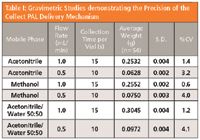No Loss, No Drip Fraction Collection
LEAP has developed a new instrument for collecting the entire mobile phase stream during metabolic profiling HPLC–MS analyses into a sealed, 96-well, LTuma plate.
David P. Holub, Peter Smith, and Zach Dai, LEAP Technologies, Inc.
LEAP has developed a new instrument for collecting the entire mobile phase stream during metabolic profiling HPLC–MS analyses into a sealed, 96-well, LTuma plate. There are currently no alternative "off-the-shelf" collectors which can do this. Drop collectors make it possible for a droplet to miss a collection site during a well-to-well move, causing contamination and cannot pierce sealed plates. Solenoid collectors do not collect the entire stream, as the flow is diverted to waste during a well-to-well move. Loss of sample, and ultimately time, can lead to repeat studies and add to the overall cost of development. Spills of radiolabeled compounds are, in their own right, a nightmare for any health and safety team.
LEAP developed the Collect PAL, modifying CTC Analytics PAL platform, in order to address the biotransformation laboratory's requirements. The system supports temperature control (4–40 °C) of the collected fractions. In its maximum capacity the Collect PAL can hold 24 trays, and can collect into 96- and 384-well plates, as well as 2-, 4- or 8-mL vials. LEAP Shell software controls the instrument and many application parameters are user specified to fit the methods and conditions as required. The Collect PAL has a proprietary syringe mechanism for total stream collection.
Experimental Set-up for the Gravimetric Study
- Isocratic HPLC pump, 5 mL/min — isocratic
- 0.05" ID Peek tubing from pump to PAL
- Tare and Net Weight 2.0 mL, 12 × 32 mm, septa-capped vials using LEAP's Balance PAL
- HTC Collect PAL version equipped with Ambient 6-position Stacks
- LEAP Shell v3.0 with Collect PAL Application release 1.7
- 100% ACN – HPLC Grade
- 50:50 DI H2O: ACN HPLC Grade
- 100% MeOH – HPLC Grade
Results
The gravimetric data supports the new technology and shows LEAP meets the requirements as outlined. These gravimetric experiments are supported by more than 20 systems operating in the USA and Canada running radiolabeled experiments. Using typical LC mobile phases, two flow rates were examined and 54 vials collected at different collection times per well settings. Table I displays these results. The Collect PAL was able to provide great precision from 0.6–4.1% CV of the anticipated delivery weight to each vial. Further studies have shown that the Collect PAL can collect in speeds down to 2.4 s/well and can be optimized for HPLC and UHPLC systems collecting into 96- and 384-well plates.

Table I: Gravimetric Studies demonstrating the Precision of the Collect PAL Delivery Mechanism
Conclusion
LEAP Technologies has developed a new state of the art Fraction Collection Instrument, The Collect PAL, capable of meeting the demands of DMPK research groups to acquire much needed data for metabolomic profiling studies. In this development effort the Collect PAL was capable of:
- Fraction Collection from 0.6–4.1% CV of target weight
- Delivering the entire stream with a no-loss, no-drip mechanism into specified sealed vials
- Collection rate down to 2.4 s/well

LEAP Technologies, Inc.
P.O. Box 969, Carrboro, NC 27510
tel. (919)929-8814; fax (919)229-8956
Email: info@leaptec.com; Website: www.leaptec.com

The Benefits of Custom Bonded Silica
April 1st 2025Not all chromatography resins are created equal. Off-the-shelf chromatography resins might not always meet the rigorous purification requirements of biopharmaceutical manufacturing. Custom bonded silica from Grace can address a wide range of separation challenges, leading to real performance improvements. Discover more about the latest innovations in chromatography silica from Grace, including VYDAC® and DAVISIL®.
5 Things to Consider When Selecting a Chromatography Silica
April 1st 2025Particularly in the pharmaceutical industry, drug purity isn’t just a goal – it’s essential for achieving safety, stability and efficacy. However, purification is easier said than done, especially with challenging molecules like DNA and RNA “oligonucleotides,” due in large part to their diversity and the range of impurities that can be generated during production. Enter DAVISIL® chromatographic silica, with a wide range of pore diameters and particle sizes to meet your specific application, performance and sustainability requirements. Before you choose the chromatography resin for your next purification application, take a look at these 5 considerations.
Automating Protein Purification: Efficiency, Yield, and Reproducibility
March 27th 2025Recent advancements in automated protein purification stress the importance of efficiency, scalability, and yield consistency. This eBook compares different purification platforms, highlighting their impact on downstream applications and demonstrating how automation enhances throughput and process control.
MilliporeSigma: Ultrapure Water for Sensitive LC-MS Analysis of Pesticides
March 25th 2025The aim of the study was to illustrate the efficiency of Milli-Q® water purification systems in eliminating pesticides from tap water, thereby producing and delivering reliable and consistent-quality ultrapure water suitable for pesticides analysis














